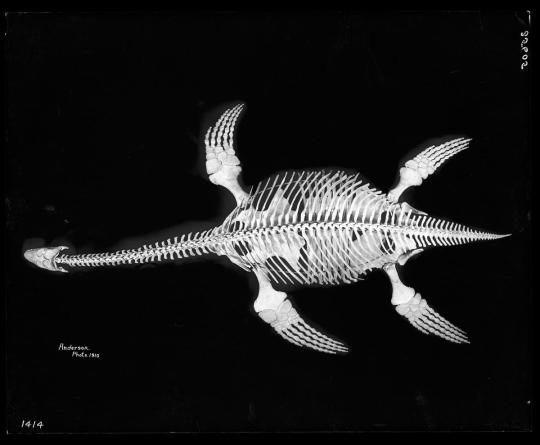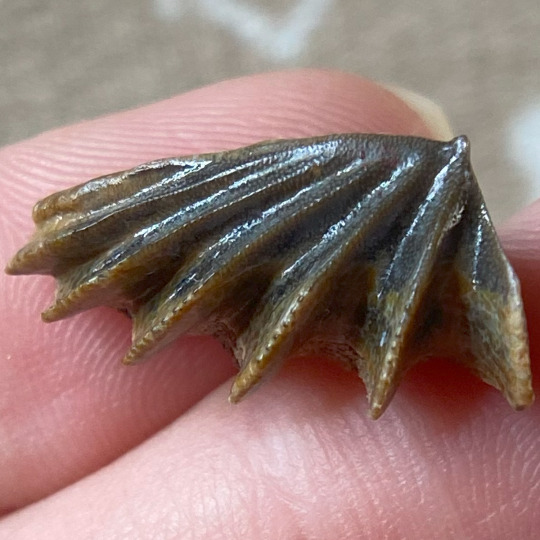#Triassic fossil
Explore tagged Tumblr posts
Text

Skin? Moisturized. Teeth? Tusk-like. Today’s mood? Mastodonsaurus giganteus. This animal lived during the Late Triassic about 215 million years ago. It’s an extinct relative of frogs and salamanders, but it probably behaved more like a crocodile: Its large, flat skull and tusk-like teeth (some of which protruded through the skull) seem to be adapted for seizing large prey. You can see this life-sized model in the Museum’s Hall of Vertebrate Origins! Plan your visit.
#science#amnh#museum#nature#natural history#animals#fact of the day#paleontology#did you know#cool animals#mastodonsaurus#triassic#vertebrates#ancient animals#fossil friday
2K notes
·
View notes
Text

The Triassic Cuddle
#art#my art#my art i guess#digital art#my artwork#illustration#digital painting#digital illustration#medibang#medibang art#the triassic cuddle#paleoart#prehistoric art#thrinaxodon#broomistega#triassic#paleontology#fossils#prehistoric animals#mesozoic#triassic cuddle#fossil art#wildlife art#wildlife#wildlife illustration#animal illustration
602 notes
·
View notes
Text

12.1" Polished Triassic Petrified Wood Round - Poison Springs, Utah
#triassic#petrified wood#wood fossil#plant fossil#plants#fossil#fossils#fossilized#png#transparent#Utah#paleontology#paleoblr#prehistoric#plant
37 notes
·
View notes
Text




Tanystropheus hydroides - polymer clay sculpture
#biology#palaeoart#fossils#geology#paleoart#sciart#science#mesozoic#palaeontology#dinosaurs#tanystropheus#triassic#tanystropheus hydroides#super sculpey#sculpture#polymer clay
29 notes
·
View notes
Text

A Triassic lungfish tooth plate, likely an Arganodus atlantis or Ceratodus arganensis from the Argana Group in the Argana Basin of Morocco. Arganodus has sometimes been synonomized with the genus Asiatoceratodus. This specimen comes from a very old French collection from the 1960s and unfortunately lacks detailed locale information.
#fish#lungfish#dipnoi#fossils#paleontology#palaeontology#paleo#palaeo#arganodus#ceratodus#asiatoceratodus#arganodontidae#ceratodontidae#asiatoceratodontidae#triassic#mesozoic#prehistoric#science#paleoblr#アルガノドゥス#ケラトドゥス#アジアトケラトドゥス#ハイギョ#アルガノドゥス科#ケラトドゥス科#アジアトケラトドゥス科#化石#古生物学
132 notes
·
View notes
Text

what if we kissed at the mazon creek fossil beds 😳
#biology#sciblr#stem#science#paleontology#geology#minerals#crystals#gems#rocks#dinosaurs#fossils#evolutionarybiology#triassic#naturalhistory#mosasaur#prehistoric#dinos#dinosaur#paleo art#triceratops#spinosaurus#dinosuar
340 notes
·
View notes
Text
coping with the reality that we’ll never get another season of prehistoric park by imagining that bob and nigel would learn that hadrosaurs enjoy jazz kind of like cows do and would end up mesmerizing a herd of them by jamming out on some trombones in a field
#prehistoric park#nigel marvin#paleoart#paleontology#prehistoric planet#dinosaurs#palaeontology#paleo#prehistoric#dinosaur#cretaceous period#jurassic period#deinonychus antirrhopus#dromaeosaurid#hadrosaur#tim haines#olorotitan#parasaurolophus#corythosaurus#edmontosaurus#maiasaura#triassic#walking with dinosaurs#ankylosaurus#tyrannosaurid#fossils#pterosaur#velociraptor#formations#fossilized wonders
12 notes
·
View notes
Text

Flooding by Karnal The Blue Jay
#Triassic cuddle#made this last night on bluesky#in my feelings#this fossil is the death of me#finally picked my poet pen name
12 notes
·
View notes
Note
Happy national fossil day! What's your favorite fossil?
Every single time I think about the Triassic cuddle fossil I burst into tears so I guess that one by virtue of how much of an impact it has on my brain
#the Triassic cuddle fossil is one of only two things that can make me cry on command#I will not tell you the other at this time.#I don’t want anyone to have too much power over me
45 notes
·
View notes
Text

This is a centipede track. Middle or Late Triassic. 240-220 mya. I spotted this at my neighbor’s property about half mile away and he let me drag it home.
26 notes
·
View notes
Photo

Fossil Fish Bones in Coprolite Bed Matrix – Westbury Formation, Upper Triassic, Aust Cliff UK – Genuine UK Fossil with COA
This listing is for an exceptional specimen of fossil fish bones preserved in matrix, collected from the famous fish, reptile and coprolite bed at Aust Cliff, near Bristol, UK. This matrix originates from the Westbury Formation, part of the Penarth Group, dating back to the Upper Triassic period—approximately 205 million years ago.
The specimen contains clear fossilised fish bone fragments, showcasing the excellent fossil preservation quality for which this horizon is renowned. The Westbury Formation at Aust Cliff is famous globally among palaeontologists for its wealth of vertebrate fossils, including remains of fish, marine reptiles, coprolites, and even dinosaur material.
Your specimen was discovered by our experienced field team, Alister and Alison, on 07 April 2025, and has been expertly cleaned, prepped, and stabilised by Alison to reveal its fossil content with care and precision.
Geological Information:
Fossil Type: Fish bones (possibly from genera such as Saurichthys, Birgeria, or similar Triassic taxa)
Formation: Westbury Formation
Group: Penarth Group
Age: Upper Triassic (Rhaetian Stage)
Location: Aust Cliff, Bristol, England
Depositional Environment: Coastal marine lagoonal mudstone – shallow, anoxic marine conditions ideal for preservation
Biozone: Within the Psiloceras planorbis ammonite biozone (used for dating overlying beds)
Notable Features:
Genuine UK vertebrate fossil from a classic heritage site
Appears in original matrix from the fossil bed
Ready for study, display or collection
Each fossil is unique and the photo shows the actual specimen you will receive. Scale cube = 1cm. Please refer to the photo for full sizing.
100% Genuine Specimen – Certificate of Authenticity Included
All of our fossils are carefully selected, professionally prepared, and guaranteed to be 100% genuine. This item comes with a Certificate of Authenticity for your peace of mind.
A great addition for any fossil collector, educational display, or natural history enthusiast!
If you need a bundled listing with similar fossils from this bed (e.g., reptile bones, coprolites, or teeth), feel free to reach out!
#Fossil fish bones#Triassic fossil#Aust Cliff fossil#Westbury Formation#Penarth Group#fish fossil UK#coprolite bed fossil#British fossil#authentic fossil#Upper Triassic vertebrate#prehistoric fish remains#UK fossil bones#fossil matrix#fossil fish bone specimen#fossil collectors UK
0 notes
Text


It's time for Fossil Friday! Meet Cryptocleidus oxoniensis, a short-necked plesiosaur. Plesiosaurs were large marine reptiles that lived from the late Triassic to the end of the Cretaceous. The plesiosaurs had extensive modifications to the shoulder and pelvic girdles: these elements form large, flat sheets of bone, presumably for the attachment of swimming muscles. Cryptocleidus' trunk was very rigid and short, and the short tail could only function as a rudder, leaving the limbs as its main organ of propulsion.
Photos: © AMNH
Image 1: Cryptocleidus on display in the Museum.
Image 2: Photographic negative of the fossilized remains of Cryptocleidus, circa 1910.
#science#amnh#museum#fossil#nature#natural history#animals#paleontology#plesiosaur#cretaceous#triassic#cool animals#ancient animals#fossil friday
449 notes
·
View notes
Text
Brb crying, shitting, throwing up because I remembered The Triassic Cuddle exists. We are all scared animals in the end, huh?? They knew they were in danger and sought out comfort and shelter together. Did it matter in the end? No. They died. But they still tried...
8 notes
·
View notes
Text

14" Plate With Two Fossil Crinoids (Encrinus) - Germany
#fork lol#triassic#encrinus#fossil crinoid#Crinoid#crinoids#Germany#png#transparent#fossil#fossils#paleontology#paleoblr#prehistoric
30 notes
·
View notes
Text

#biology#palaeoart#fossils#geology#paleoart#sciart#science#mesozoic#palaeontology#dinosaurs#velocipes#triassic#poręba#poreba
21 notes
·
View notes
Text

A Triassic lungfish tooth plate of an Arganodus dorotheae from the Bull Canyon Formation in Quay County, New Mexico, United States. Arganodus has sometimes been synonomized with the genus Asiatoceratodus.
#fish#lungfish#dipnoi#fossils#paleontology#palaeontology#paleo#palaeo#arganodus#asiatoceratodus#arganodontidae#asiatoceratodontidae#triassic#mesozoic#prehistoric#science#paleoblr#アルガノドゥス#アジアトケラトドゥス#ハイギョ#アルガノドゥス科#アジアトケラトドゥス科#化石#古生物学
37 notes
·
View notes